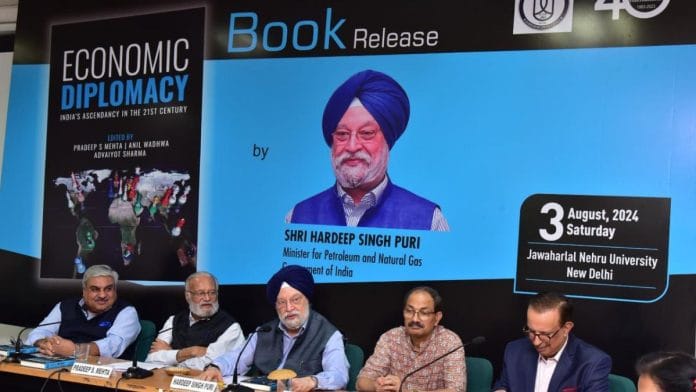As one of the fastest-growing economies, the role of Indian diplomats has expanded in the past three decades beyond security and international order. But India’s recent quest for self-reliant nationalism needn’t shrink it.
“Atmanirbharta does not mean turning your back to the outside world. India is getting transformed,” said Union Minister Hardeep Singh Puri at the launch of Economic Diplomacy: India’s Ascendancy in the 21st Century at the School of International Studies in Delhi’s Jawaharlal Nehru University on Saturday.
“Economic diplomacy must get bigger,” stressed Puri, a former diplomat himself.
From trade talks to new economic corridors, Modi’s diplomats have played hardball with the United States, China and the Middle East. They have formed new coalitions – the Bay of Bengal Initiative for Multi-Sectoral Technical and Economic Cooperation (BIMSTEC) and India-Middle East-Europe Economic Corridor (IMEC) in addition to the existing Regional Trade Agreements and Free Trade Agreements. Several other deals are in the pipeline.
“In a $4 trillion economy, a starting point for any analysis should be that 50 per cent of that GDP comes from the external sector. If that is true, it stands to reason that if you do turn your back to the outside world, your GDP will not grow,” Puri added.
Becoming a global superpower
The book, published by global public policy research group CUTS International, is a compilation of nearly 30 essays and first-hand accounts of those who have served as the “practitioners” of economic diplomacy. Retired Indian Foreign Service officers convened to catch up with former colleagues, exchange anecdotes and applaud their respective contributions to the field.
As the ex-diplomats shared insights with the audience, which included ambassadors from Brazil and Hungary, and JNU professors and students, the consensus was that India is poised to become a global superpower, and that the ‘Viksit Bharat 2047’ vision is no pipe dream.
Against this backdrop, the vehicle of economic diplomacy assumes higher significance, the speakers at the event agreed.
At one level, all diplomacy is economic, said former diplomat Ajay Bisaria, who has served as India’s envoy to Canada, Pakistan and other countries, and is one of the contributors to the book. He pointed out that all of the country’s external engagement is now designed to meet the national objective of preserving the India story of eight to 10 per cent growth for the next two decades.
“For that, we have to get peace and stability in the neighbourhood, even globally, so that that story doesn’t get derailed,” said Bisaria.
Panellists stressed the importance of innovation within the realm of economic diplomacy keeping in mind India’s population and critical geostrategic location.
“Economic diplomacy needs to have new tools and new methodology today in order to be able to capitalise on the situation that India finds itself in,” said Anil Wadhwa, Former Secretary (East) of the Ministry of External Affairs. He is one of the editors of the new book, along with CUTS International’s secretary general Pradeep S Mehta, and assistant policy analyst Advaiyot Sharma.
This needs to be ingrained and integrated into every Indian diplomat and bureaucrat’s work. Former envoy Banashri Bose Harrison suggested that the priority should be to examine our national interests for the next 25 years and plan accordingly.
“We need to have clarity on what our national interests will be in 2047, so that we can, in 2047, be viksit (developed). We need to look within the country and give feedback to the policymakers,” she said.
Also read: Tarang Shakti will be good for UP and Tamil Nadu defence corridors, bring European investment
Indian diplomacy must adapt
The roots of India’s economic diplomacy lie in the 1991 reforms, which opened the country to the global market. The role of the external affairs ministry and foreign policy saw major overhauls all through the 1990s, and economic diplomacy has continued to evolve since.
Now, with the rising complexities in the global economic landscape due to dynamic factors like technology, geopolitics and the emergence of artificial intelligence, diplomacy must keep up.
“India’s multilateral diplomacy has traditionally suffered from a wilful lack of resources,” said Puri. He recalled that the size of Indian delegations in multilateral engagements used to be small even back when he served as the country’s permanent representative to the United Nations. “As you grow in terms of economic size, the number of issues you have to deal with are much higher,” he said.
But diplomacy isn’t just for diplomats. The private sector and industry players who have economic interests across the world have a role to play as well.
“We need to tap the private sector and its resources in order to integrate them into our system to get that level of expertise, which will only come from super experts. I want the finest Indian expert on artificial intelligence on the table with me if I am negotiating in Geneva,” said Bisaria.
(Edited by Zoya Bhatti)






